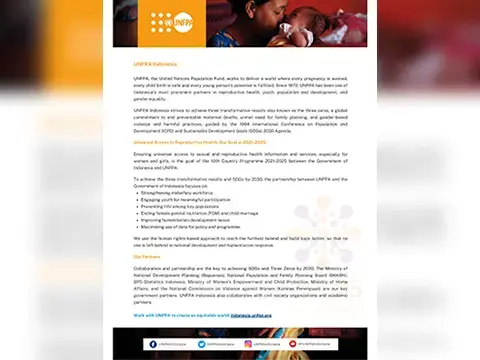 West Java, INDONESIA - Using plants available abundantly in Tasikmalaya district and generation-old, traditional weaving skills, Ibu Epon (63) has been making fancy handycraft and at the same time weaving close social bond and economic empowerment for women in her small village.
West Java, INDONESIA - Using plants available abundantly in Tasikmalaya district and generation-old, traditional weaving skills, Ibu Epon (63) has been making fancy handycraft and at the same time weaving close social bond and economic empowerment for women in her small village.
“It’s been 19 years since the first time I set up my own small business venture. Alhamdullilah (Thank God), it expands and now, I have employed around 40 to 50 women of different age group in this small village,” said Ibu Epon, a mother of three.
She is one of the beneficiaries of the Women’s Empowerment Programme in Rajapolah sub-district, conducted by the National Family Planning Coordinating Board (BKKBN) that the United Nations Population Fund (UNFPA) supports.
The products they produced are various types woven handicrafts like hats, bags, decorative mats, sandals and multi-purpose containers, just to name a few. All these attractive objects are made mainly from a palm-like plant Carludovica palmate, that they simply refer to as panama palm.
The plant grows wild in her village and in many parts of Indonesia. The part of the plant used as a raw material is the leaves. Shredded into long fine strips, the leaves are then boiled, dyed into various colors, aerated and completely dried under the heat of sun. Once dried, the strips are twisted into threads and the threads are woven into any desired objects.
And even though her venture is a low-profile home industry but the products she produces have been sold in other provinces and, through a local exporting company, abroad. She received orders for woven hats from a company to be exported to Barcelona, Spain for the 1992 Olympic game. Now, orders for specially designed woven products also come from a number of Jakarta-based companies.
Like other village women, Ibu Epon learned to master the weaving skill from her parents since she was a child. Back then, she used the skill to make simple things for herself using different materials, including coconut leaves, which like panama palm are available abundantly.
“The materials being used to weave an object determine the end result. The objects would have finer appearances when woven using panama palm and they sell better even though the price is slightly more expensive,” she explained, adding that the price for a panama hat is around Rp 25,000 (US$2.6), while a set of two bags starts from Rp 35,000 ($3.6).
Everyday, some of her workers have to work in the paddy field in the morning and some others go to school. At noon, they go to Ibu Epon’s house and weave some objects until late in the afternoon. One worker can weave one hat and three to five small bags everyday. In total, the average outputs of Ibu Epon’s group are around 50 woven hats and 150 bags daily. For each item produced, each of the women receives a fee ranging from Rp 5,000 to Rp 7,500 depending on the object.
“It’s not bad. We earn additional money for food and can have a little saving at the end of the month for health care and children’s education,” said Oneng Unasih, a group member who is also a female field worker with both BKKBN and local integrated health post.
According to Ibu Epon, demands for good quality woven handycraft is still high and no mater how many items her group make, there are always people or companies to whom she can sell the products.
She also realizes that ensuring the availability of raw materials becomes important, knowing that they rely on the plant for their livelihood. “That’s why we grow the plant too so that we can continue weaving without depleting the village of the panama palm,” Ibu Epon said.
Looking after each other
The routine gathering at Ibu Epon’s simple house serves different purposes. It allows village women to earn money and on the other hand, enables the group members to bond and look after each others.
While weaving, the women chat about various topics and the discussions sometimes touch on family and (reproductive) health issues, such as family planning and safe pregnancy.
“These women know little about health and the discussions give me the opportunity to raise their awareness on health and family planning issues,” Oneng said. Still a relative of Ibu Epon, Oneng is one of the few women in the village with knowledge on health issues and to whom the women turn to for advice.
In addition, since around 60 percent of Ibu Epon’s workers are women aged 55 years old or older, she sees the need for promoting health among these women. Health workers are occasionally invited to the gathering to monitor the physical conditions of the group’s elderly members by weighing their body weights, recording their blood pressures and checking any health complaints.
“At their age, they are happy to be productive. I also want to give them special attention so that they are healthy too. We are all like one big family,” Oneng said.
Tags: Reproductive Health, Population, Reproductive Health


